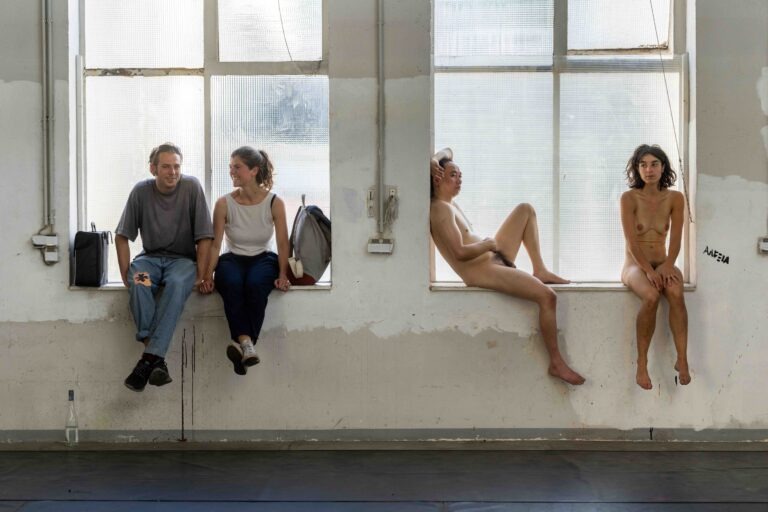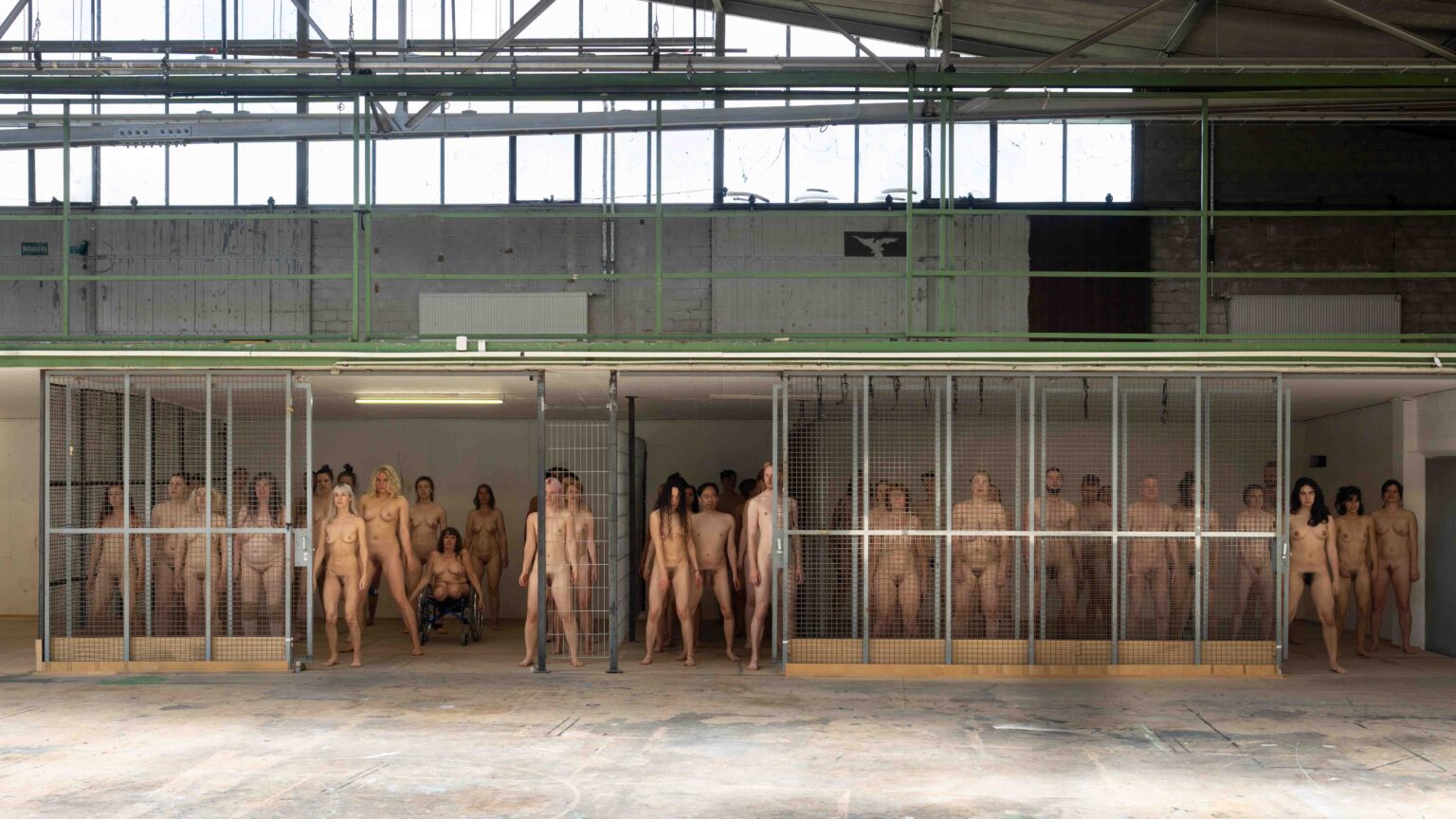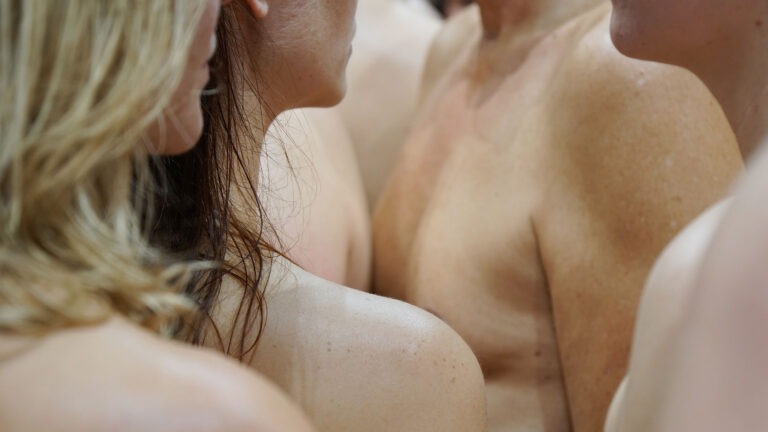Habitat / Cologne (2022) 2h
Habitat is Doris Uhlich naked bodies of 50 people flick, vibrate and slap against each other to electronic sounds and abstract techno tracks. The performers celebrate their unity in diversity. As individuals and as a crowd at the same time they conquer the space in a choreography that is captivating, highly energetic, and, at times, collectively reposing. Frascati is transformed into a habitat full of unexpected life forms – the audience moves about freely in the available space. The project transcends conventional ideas of the body, dance, and of nakedness in a subversive manner.
Habitat is a utopia. A shameless but also a free-of-shame hymn to a naked body beyond cultural inscriptions and conventional ideals of beauty. The body is not devalued to the level of a fetish, an object; and carnality is neither metaphorically nor poetically ideologized but understood in a material sense and is therefore presented in all its mass and weight yet also in its fragility.
Habitat can be developed in different places with local people. Doris Uhlich is interested in working with large ensembles, which are developed temporarily at specific places in order to transform dance into a collective ritual.
11 &12 June 2022
Schauspiel Koeln
Oskar–Jäger-Str. 175
Colone
Germany
Concept, Choreography, DJ Doris Uhlich
Dancers:
Philemon Mukarno , Ella Max Jonker, Luise Kostopoulos, Maria Tepper, Mim Schneider, Ute Frederich, Sissi Grasser, Vera Rosner-Nógel, Tina Amerstorfer, Vanessa Basilio de Luca, Jeanne Marie Bertram, Nina Boerckel, Hannes Bohne, Viola Cantù, Milena Chotjaturat, Jemima Rose Dean, Amelie Dieudonnê, Eva Gemmer, Elena Gorki, Zoelie Guckert, Viviane Hamm, Jakob Heimbach, Thierry Herman, Carlotta Hofrichter, Mario Högemann, Thaddäus Maria Jungmann, Paulina Jürges, Francesca Karmrodt, Lina Katt, Swantje Kawecki, Nino Kohn, Stella Krausz, Theo Krausz, Noemi Krausz, Anne Kugener, Anthea Marckmann, Hartmut Misgeld ,Paula Pabel, Sabine Rave, Miriam Rieck, Leonardo Rodrigues, Hanna Filu Sampe, Vera Heritier, David Schlecht, Sebastião Soares, Milica Tancic, Olina Welge, Svea Lange, Haha Wong, Frida Zack, Benze Charlotte Werner, Pia Wiesner
„Britney X“-Festival in Köln Angezogen unter 50 zuckenden Nackten

Von Christian Bos
“Gottfried Benn once described, as I enter the empty factory hall in Ehrenfeld: ‘A lump of slime in a warm moor.’ On the floor of the hall, naked bodies roll around in a gelatinous slime mass. They tumble, slide over each other, scramble up, and stretch elongated strands of the sticky substance over their heads.”

On June 11th and 12th, as part of the BRITNEY X Festival, Tanz Köln invites the famous Austrian choreographer Doris Uhlich to present her performance HABITAT. She creates a utopia on stage by exploring the idea of naked bodies not being fetishized or objectified. In many of her projects, Uhlich deals with beauty standards and body norms, and in this dance performance, she breaks the usual concepts of body, dance and nudity. We are excited to see it!

As part of the Britney X Festival, Tanz Köln invites Austrian choreographer Doris Uhlich with her production HABITAT to Cologne. She will develop the installative dance performance with a local cast and present it during the festival. HABITAT is a utopia – a shameless, but also shame-free hymn to the naked body beyond cultural inscriptions and common beauty ideals. The body is not fetishized, degraded to an object, or metaphorically or poetically idealized, but is materially perceived and shown in its entirety, weight, fragility, and all. Doris Uhlich describes her work as a search and research for collective energy, networking, connection, and empathy. In HABITAT, she looks for rituals in which bodies are celebrated and experienced as the epicenter of action and change. The performance takes place in the old workshops of Bühnen Köln, Oskar-Jäger-Str. 175 in Cologne-Ehrenfeld.





























